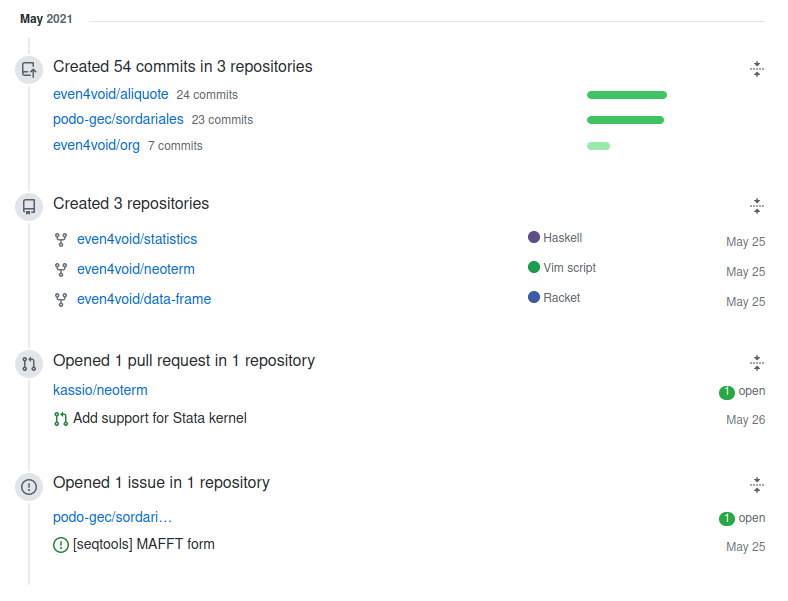Latest micro-posts
You can also also view the full archives of micro-posts. Longer blog posts are available in the Articles section.
The new Firefox UI (v89) is quite nice actually. At least on Ubuntu, with a 16:9 13 inch display. I found it less appealing the first time I saw the new tab on the Developer version on my Macbook last week.

Turning 47 today. At least a prime number. #self
Unix Shell Programming: The Next 50 Years (PDF, 8 pp.). #unix
Ironic as this may sound, my first suggestion for how to write programs that are supposed to be random is to make them deterministic. — Probabilistic Programming Habits
“Using the REPL” actually means typing your code in your favorite editor. However, one sends the code to evaluate in a REPL, which may not even be visible at all. Once the code is evaluated, the results immediately show up in the editor, so you get the feedback right away. Obviously, this requires some upfront setup, but a proper Clojure REPL setup exists in all major editors. Just google it.
Note that one normally sends the code to evaluate with a single key stroke. Note also, a very important point that people often miss, is that this “sending code to evaluate” is uniquely convenient in Lisp because of the parentheses.
There’s a notion of “form” in Lisp, that is the code enclosed between a pair of parentheses, which can be independently evaluated. So, when next time someone insists that their favorite non-Lisp language also has a REPL, ask them, does it have a notion of “form”?
The benefit of a form, is that one no longer needs to use a mouse or some awkward key combinations to painstakingly select a region of code first, before sending it out for evaluation. Instead, one can use a single key stroke that means “evaluate the form under the cursor”, or “evaluate the form before the cursor”, etc, to precisely define the scope and send the code at the same time. — How much can a Clojure developer do alone?
I mostly don’t care how popular Lisp is. I am not using Lisp in order to score better in a popularity contest. I am using Lisp because it is the best programming language I know for the kind of programs I write. I don’t think there is anything particularly or seriously wrong with Lisp. It might be that at the moment it does not provide what some people have come to expect from a programming language (free cross-platform implementation with all the libraries you could possibly want). Whether this will ever happen, I don’t know, and I don’t care (though I respect that others might). I do think I know that some of the people who want this to happen will have to get their hands dirty and just do it. No amount of lamenting is going to magically create any libraries. — What is wrong with Lisp?
First contrib for a very useful Vim plugin ;-)

As I write this, I realized that this PR has already been merged.